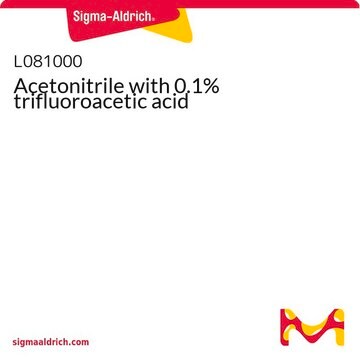1.59002
Acetonitrile solution
suitable for LC/MS, LiChrosolv®, contains 0.1% (v/v) formic acid
Synonym(s):
Acetonitrile solution, ACN, Cyanomethane, Ethyl nitrile, Methyl cyanide
About This Item
Recommended Products
product name
Acetonitrile with 0.1% (v/v) Formic acid, hypergrade for LC-MS LiChrosolv®
vapor pressure
97 hPa ( 20 °C)
Quality Level
product line
LiChrosolv®
form
liquid
expl. lim.
3.0-17 % v()
concentration
0.095-0.105 % (v/v)
technique(s)
LC/MS: suitable
bp
81.6 °C/1,013 hPa
mp
-45.7 °C (-50.3 °F)
transition temp
flash point 2 °C
solubility
water: soluble
density
0.782 g/mL at 25 °C
cation traces
Al: ≤0.05 ppm
Ca: ≤0.05 ppm
Fe: ≤0.05 ppm
K: ≤0.025 ppm
Mg: ≤0.05 ppm
Na: ≤0.25 ppm
application(s)
general analytical
format
mixture
storage temp.
2-30°C
SMILES string
CC#N
InChI
1S/C2H3N/c1-2-3/h1H3
InChI key
WEVYAHXRMPXWCK-UHFFFAOYSA-N
Looking for similar products? Visit Product Comparison Guide
Related Categories
General description
Application
| LiChrosolv® hypergrade acetonitrile with 0.1% (v/v) formic acid is used as a mobile phase solvent in gradient elution of peptides by LC-MS/MS. The product is also featured in the method development for analysis of California list of pesticides in cannabis. |
Features and Benefits
- microfiltered by 0.2 µm filter
- the most comprehensive application range due to the largest retention time range
- analytical reliability due to the highest possible purity and a minimum signal-to-noise ratio
- time and cost savings due to the best possible batch consistency, thus avoiding repetitive analysis
Other Notes
Legal Information
related product
Signal Word
Danger
Hazard Statements
Precautionary Statements
Hazard Classifications
Acute Tox. 4 Dermal - Acute Tox. 4 Inhalation - Acute Tox. 4 Oral - Eye Irrit. 2 - Flam. Liq. 2
Storage Class Code
3 - Flammable liquids
WGK
WGK 2
Flash Point(F)
35.6 °F - (refers to pure substance)
Flash Point(C)
2 °C - (refers to pure substance)
Certificates of Analysis (COA)
Search for Certificates of Analysis (COA) by entering the products Lot/Batch Number. Lot and Batch Numbers can be found on a product’s label following the words ‘Lot’ or ‘Batch’.
Already Own This Product?
Find documentation for the products that you have recently purchased in the Document Library.
Customers Also Viewed
Articles
An optimized peptide mapping protocol using NISTmAb as a model monoclonal antibody, shorter incubation times, and improved digestion buffer to demonstrate minimal artificial asparagine deamidation and methionine oxidation.
An optimized peptide mapping protocol using NISTmAb as a model monoclonal antibody, shorter incubation times, and improved digestion buffer to demonstrate minimal artificial asparagine deamidation and methionine oxidation.
An optimized peptide mapping protocol using NISTmAb as a model monoclonal antibody, shorter incubation times, and improved digestion buffer to demonstrate minimal artificial asparagine deamidation and methionine oxidation.
An optimized peptide mapping protocol using NISTmAb as a model monoclonal antibody, shorter incubation times, and improved digestion buffer to demonstrate minimal artificial asparagine deamidation and methionine oxidation.
Our team of scientists has experience in all areas of research including Life Science, Material Science, Chemical Synthesis, Chromatography, Analytical and many others.
Contact Technical Service









